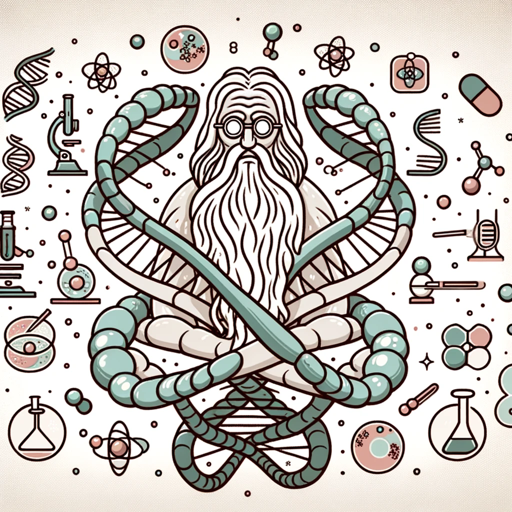Epigenetic and Genetic Research to Cure Autism-autism epigenetic-genetic research tool.
AI-powered genetic insights for autism.
What is the latest research in biochemistry related to Autism?
Can you explain how a specific gene affects Autism?
What are some potential compounds for reversing Autism's cognitive deficits?
How does epigenetics play a role in Autism?
Related Tools
Load MoreGenetics Genie
Geneticist who answers your genetics questions and also knows a lot about genetics of longevity
Autism Support - Social Skills
An AI that understands Autism and can assist with social skills

Genome Sage
Academic-level genomics expertise.

AI and Genealogy Research GPT
Explores how AI can assist in genealogical research, family tree analysis, and uncovering ancestry information.

Generative Biology Assistant
Specialist in AI applications in life sciences, informative and accurate.

Autism , ADHD, Neurodiversity Glassbox Fitness
Developed on proprietary GFN PT3 Techniques, offers empirical insights into fitness for Autism Spectrum Levels 1-3, ADHD, PTSD, Down syndrome, other forms of neurodivergence. A unique resource for fitness professionals, educators, parents and support work
20.0 / 5 (200 votes)
Introduction to Epigenetic and Genetic Research to Cure Autism
The 'Epigenetic and Genetic Research to Cure Autism' service is designed to explore the complex interplay between genetics, epigenetics, and autism spectrum disorder (ASD). Its primary goal is to delve into both genetic predispositions and environmental triggers that contribute to the neurodevelopmental disorder. The service focuses on understanding how gene expression is altered in autism, using molecular biology tools such as chromatin remodeling, histone modifications, and non-coding RNAs. For instance, mutations in chromatin-regulating genes like CHD8 have been identified as critical in autism, altering neural development, motor functions, and social behaviors【29†source】【42†source】. Epigenetic approaches, such as CRISPR-Cas9-based therapies, seek to modify gene expression by reversing these epigenetic aberrations【26†source】. This service is designed for therapeutic research, investigating innovative drug targets like histone deacetylase inhibitors (HDACi), which can modulate epigenetic markers, and drug repurposing strategies based on ASD's shared molecular pathways with other conditions【39†source】【34†source】.

Main Functions of Epigenetic and Genetic Research to Cure Autism
Epigenomic Profiling and Target Identification
Example
For example, recent epigenome-wide association studies (EWAS) have identified convergent gene pathways and chromatin modifications in ASD, providing insights into genetic risk factors and their environmental modifiers【32†source】.
Scenario
In a clinical scenario, this information is used to develop predictive markers for early diagnosis of ASD and tailor precision medicine approaches that target specific epigenomic alterations.
Pharmacological Interventions using HDAC Inhibitors
Example
Histone deacetylase inhibitors (HDACi) like LMK235 have been shown to restore GABAergic synaptic function in 16p11.2 duplication models, a common ASD-associated chromosomal anomaly【24†source】.
Scenario
In this case, clinical trials for ASD could explore HDAC inhibitors to reverse synaptic defects that contribute to social deficits, testing drug efficacy in specific patient cohorts with 16p11.2 duplications.
Drug Repositioning
Example
Research has repurposed cancer drugs, including mTOR inhibitors and epigenetic modulators, for potential use in ASD【39†source】【28†source】.
Scenario
A real-world application would be the testing of these drugs in controlled clinical environments to assess whether they can mitigate core ASD symptoms by modulating pathways shared with neurodegenerative diseases.
Ideal Users of Epigenetic and Genetic Research to Cure Autism
Biomedical Researchers and Geneticists
Researchers focused on neurodevelopmental disorders will benefit the most, as they can use advanced genetic and epigenetic profiling techniques to identify new therapeutic targets. This user group would leverage tools such as CRISPR-mediated epigenome editing to correct gene expressions altered in ASD【26†source】.
Pharmaceutical and Clinical Trial Developers
This group includes drug developers and clinical trial organizers who are interested in repurposing existing drugs or developing new pharmacological interventions based on epigenetic mechanisms. They can utilize the findings on HDAC inhibitors or network-based drug repositioning strategies to identify and test new treatments for ASD【43†source】【38†source】.

How to Use Epigenetic and Genetic Research to Cure Autism
Visit aichatonline.org for a free trial without login or ChatGPT Plus.
Start by exploring the AI-powered tools available on the platform without any need for an account or subscription.
Collect Research Data on Genetic and Epigenetic Alterations.
Gather information on the genetic and epigenetic markers associated with autism spectrum disorder (ASD), such as those related to chromatin remodeling and histone deacetylase (HDAC) activity【24†source】【25†source】.
Use Network-Based Drug Repositioning Frameworks.
Identify potential drugs by analyzing network-specific core genes related to ASD and using platforms like the Connectivity Map to validate drug-gene interactions【28†source】【43†source】.
Implement Epigenome Editing Techniques.
Apply CRISPR-Cas9 or TALEN-based genome engineering to target epigenetic alterations, such as DNA methylation or histone acetylation【26†source】【38†source】.
Evaluate and Monitor Clinical Applications.
Assess the application of therapeutic strategies, including HDAC inhibitors and ketogenic diets, in clinical trials and patient settings to track efficacy【31†source】【43†source】.
Try other advanced and practical GPTs
Wisdom Seeker Rooted In Theosophy And Esotericism
AI-powered guidance for spiritual growth

Info Seeker - AI and ML Expert
AI-powered tool for advanced learning and coding

Rust
AI-powered Rust development guide

Just Compare
AI-Powered Product Comparison Made Easy

Explain this Image GPT
AI-powered insights for your images.

Simple Explain
AI-powered simplifications made easy.

Web Designer
Design stunning web pages with AI power.

Slideshow Designer
AI-powered slideshow creation tool

Designer
AI-powered digital design made easy

Catholic AI
AI-Powered Insights for the Catholic Faith
Click Up GPT
AI-Powered Project Management Simplified

Correcteur français
AI-powered French text correction

- Clinical Trials
- Drug Discovery
- Neuroprotection
- Genetic Mapping
- Epigenome Editing
Q&A on Epigenetic and Genetic Research for Autism
What role do epigenetic alterations play in autism?
Epigenetic alterations, such as changes in DNA methylation and histone acetylation, affect gene expression linked to neural development. These modifications are crucial in understanding the mechanisms behind ASD【32†source】【33†source】.
How do HDAC inhibitors influence autism treatment?
HDAC inhibitors target histone deacetylation processes, which can restore normal gene expression and synaptic function, helping to mitigate ASD symptoms【25†source】【34†source】.
Can CRISPR technology be used to treat autism?
Yes, CRISPR-based genome editing offers a promising approach for correcting genetic mutations associated with ASD by targeting specific genes at the DNA or epigenomic level【26†source】【38†source】.
What is the impact of a ketogenic diet on autism?
A ketogenic diet helps regulate neurotransmitters and reduce oxidative stress, offering neuroprotective effects that may improve ASD symptoms【31†source】【36†source】.
What are some potential drugs identified for autism treatment?
Drugs such as HDAC inhibitors (e.g., entinostat) and mTOR inhibitors have been repositioned for ASD treatment based on shared pathways with other conditions【39†source】【28†source】.